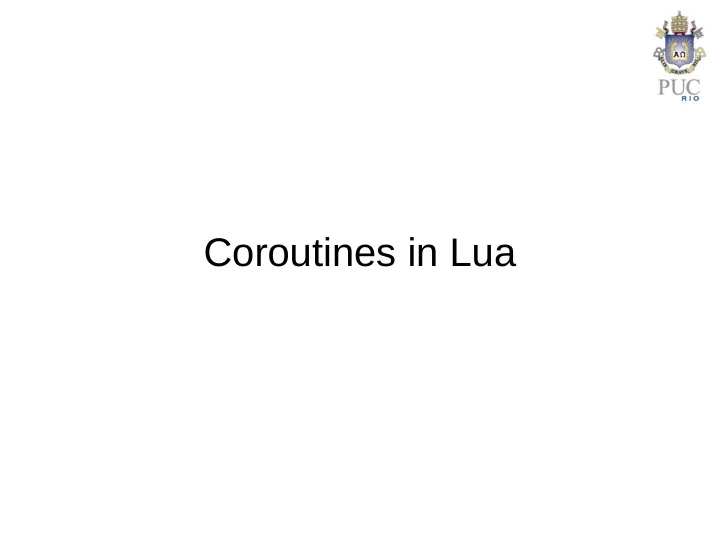

Coroutines in Lua
Coroutines ● An unconventional, but quite powerful control mechanism ● Well known as an abstract concept, but with several variations ● Variations with big differences 2
Kinds of Coroutines ● Symmetric or asymmetric ● Stackful ● First-class values 3
Symmetric and Asymmetric Coroutines ● Symmetric coroutines: one primitive for transfering control ● Typically called transfer ● Asymmetric coroutines: two primitives for transferring control ● Typically called resume and yield resume/yield ↔ call/return transfer ↔ goto 4
Stackful Coroutines ● Non-stackful coroutines can be suspended only inside the body of the original function ● Original concept (co-routine x sub-routine) ● Stackful coroutines can be suspended while calling other functions ● As implemented in Modula ● Similar to cooperative multithreading 5
First-class Coroutines ● Coroutines can be represented by first-class values ● can be resumed anywhere in a program ● Restricted forms of coroutines are not first class ● e.g., generators in CLU and other languages 6
Full Coroutines ● A full coroutine is a stackful, first-class coroutine ● For full coroutines, symmetric and asymmetric control are equivalent ● you can implement one with the other ● just like goto x call/return ● Full coroutines are equivalent to one-shot continuations ● you can implement call/1cc with them 7
Coroutines in Lua ● Full, asymmetric coroutines ● Full coroutines present one-shot continuations in a format that is more familiar to conventional programmers ● similar to multithreading ● Full coroutines allow a simple and efficient implementation ● as compared with one-shot continuations 8
Asymmetric coroutines ● Asymmetric and symmetric coroutines are equivalent ● Not when there are different kinds of contexts ● integration with C ● How to do a transfer with C activation records in the stack? ● resume fits naturally in the C API 9
Coroutines: First Example co = coroutine.wrap(function (x) print(x) coroutine.yield() print(2*x) end) co(20) --> 20 co() --> 40 co() --> error: cannot resume dead coroutine 10
Coroutines: exchanging values co = coroutine.wrap(function (x) x = coroutine.yield(2*x) return 3*x end) print(co(20)) --> 40 print(co(2)) --> 6 co() --> error: cannot resume dead coroutine 11
Producer - Consumer function produce () function consume () while true do while true do local x = io.read() local x = receive() send(x) print(x) end end end end send = coroutine.yield receive = coroutine.wrap(produce) consume() 12
Coroutines and Iterators function permgen (a, n, f) if n <= 1 then f(a) else for i = 1, n do a[n], a[i] = a[i], a[n] permgen(a, n - 1, f) a[n], a[i] = a[i], a[n] end end end 13
Coroutines and Iterators function permutations (a) return coroutine.wrap(function () permgen(a, #a, coroutine.yield) end) end for a in permutations({1,2,3,4}) do printPerm(a) end 14
Who is the Main Program How to turn a complex interactive application into a library? 15
Who is the Main Program /* huge and complex application */ int main (int argc, char **argv) { ... } void readCommand (char *buff) { printf("enter command:\n"); fgets(buff, MAX, stdin); } 16
Who is the Main Program /* huge and complex application */ int main (int argc, char **argv) { /* create coroutine with Lua script */ ... } void readCommand (char *buff) { lua_resume(...); /* pass result to buffer */ ... } 17
Who is the Main Program -- Lua script emitCommand = coroutine.yield emitCommand("doCommand1") ... emitCommand("doCommand2") ... emitCommand("doCommand3") 18
Coroutines x continuations ● Most uses of continuations can be coded with coroutines ● coroutines ☺ ● “who has the main loop” problem – Producer-consumer – extending x embedding ● iterators x generators – the same-fringe problem ● collaborative multithreading 19
Coroutines x continuations ● Multi-shot continuations are more expressive than coroutines ● Some techniques need code reorganization to be solved with coroutines or one-shot continuations ● e.g., oracle functions 20
Recommend
More recommend